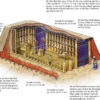
Liturgies Are the Pipes, But the Word Is the Water
By Matt McCullough | 9Marks Journal: The Ordinary Means of Grace—Or, Don’t Do Weird Stuff | 07.26.2021In our use of liturgy, how can we make sure our confidence is in the power of God’s Word, not the creativity or ingenuity of our methods?

Why the Ordinary Means of Grace Must Be Central in Our Gatherings
By David Strain | 9Marks Journal: The Ordinary Means of Grace—Or, Don’t Do Weird Stuff | 07.26.2021When we gather, let’s not mess around with our own homespun techniques. In faith, let us read the Word, preach the Word, pray the Word, sing the Word, and see and taste and touch the Word.

Why Preaching Is Primary and the Ordinances Aren’t
By Jonty Rhodes | 9Marks Journal: The Ordinary Means of Grace—Or, Don’t Do Weird Stuff | 07.26.2021Still today it is through the Word, not the bare ordinances, that men and women are “born again, not of perishable seed but of imperishable, through the living and abiding word of God” (1 Pet. 1:23).

Yes, Scripture Reading Really Does Change People
By Terry Johnson | 9Marks Journal: The Ordinary Means of Grace—Or, Don’t Do Weird Stuff | 07.26.2021Why don’t evangelical churches read the Bible during their services?

Yes, Preaching Really Does Change People
By Mike Bullmore | 9Marks Journal: The Ordinary Means of Grace—Or, Don’t Do Weird Stuff | 07.26.2021God has promised that through this apparently weak and frail means, using weak and frail creatures like us, he will accomplish much. He has said so. He has promised to do it. Believe what God has said.

The Freedom that Comes from Being Boringly Biblical
By Eric Bancroft | 9Marks Journal: The Ordinary Means of Grace—Or, Don’t Do Weird Stuff | 07.26.2021Pastor, there’s freedom in a simple philosophy of ministry. God hasn’t called you to creativity, or outpacing expectations.

“The Word Did It All”: The Necessity of Preaching According to the Protestant Reformers
By Shawn Wright | 9Marks Journal: The Ordinary Means of Grace—Or, Don’t Do Weird Stuff | 07.26.2021In the Reformation, the Word did it all. Five hundred years from now, may that be said of your ministry and mine.

Congregational Singing: Can Musical Style Dilute This Ordinary Means of Grace?
By Neal Woollard | 9Marks Journal: The Ordinary Means of Grace—Or, Don’t Do Weird Stuff | 07.26.2021Creativity matures beyond self-expression to humble service to all. This shift should be evident.

7 Reasons You Should Preach Through Revelation
By Andrew Birch | 07.23.2021If you’ve never done it before, I hope that the seven reasons I give here encourage you to preach through the book of Revelation.

Exodus 35–40: On How It Started, How It’s Going, and the Beautiful End of Exodus (Bible Talk, Ep. 35)
By A. Duke, J. Hamilton, S. Emadi | 07.21.2021By the end of Exodus, our story has come full circle: humanity has been exiled since the Garden but now he dwells in the midst of his people.

Exodus 34: On YHWH’s Self-Expositional Sermon and Why We Have It Better than Radiant-Faced Moses (Bible Talk, Ep. 34)
By A. Duke, J. Hamilton, S. Emadi | 07.14.2021Alex chats with Jim and Sam about the center of biblical theology.

Exodus 32–33: On Worshiping YHWH in a Carnival Mirror (Bible Talk, Ep. 33)
By A. Duke, J. Hamilton, S. Emadi | 07.07.2021In Exodus 26–31, Moses is on the mountain talking with God. While that was happening, what were God’s people up to?

Book Review: Bavinck, by James Eglinton
Review by Shane Walker | 07.01.2021James Eglinton has written an important, elegant, and scholarly introduction to Bavinck’s life and thought.

Exodus 26–31: On Chip & Joanna Gaines’ Tour through the Furniture of Faith (Bible Talk, Ep. 32)
By A. Duke, J. Hamilton, S. Emadi | 06.30.2021When we get to Exodus 26–31, we’re tempted to let our eyes glaze over what seems to be an overly long list of the Tabernacle furniture and its accompanying details. Is that really the case?

On Cross-Cultural Preaching (with John Onwuchekwa) | Preachers Talk, Ep. 26
By J. Meeks, J. Onwuchekwa, K. Edward Copeland | 06.24.2021God’s Word is for everyone. But how do we preach to people who are quite different from our ordinary audience?





